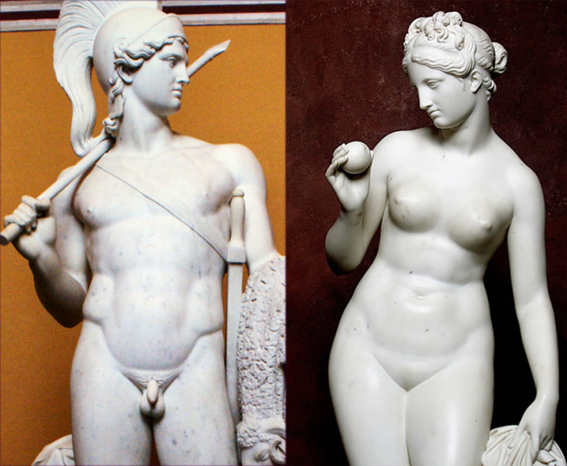The city of Sparta had forty-three temples dedicated to various Gods and twenty-two temples dedicated to the heroes (including those of the Iliad), whose deeds inspired the flourishing generations; more than fifteen statues of Gods, four altars and numerous funerary tombs. There was also a temple dedicated to Lycurgus, worshiped as a god. In a city the size of Sparta, the number of religious buildings was very noticeable.
In religious ceremonies, men and women—particularly those in the age of dating—attended, entirely naked as they did during the processions, the tournaments, the beauty contests and the dances. This already implies that the Spartans were not ashamed of their bodies, but that proudly displayed them whenever they could because they were robust, well-formed and harmonious. These events were festivals of beauty, Dionysian ceremonies in which the body was worshiped and beautified by effort and sacrifice. According to Plato, a beautiful body promises a beautiful soul and ‘beauty is the splendour of truth’.
The athletic custom of shaving the body hair and smear oneself with oil before a competition was of Spartan origin, although the Celts were given to body shave before battles. They sought thereby to extol the body; give relief, volume, detail, brightness and ‘life’ to the muscles, thus proudly displaying the result of years and years of gruelling physical training and strenuous efforts, probably to find the best partner and/or gain prestige.
The guilt and sense of sin that Christianity tried to impose in the field of body pride, made a man ashamed of the very things he was proudest. Judeo-Christian morality, by condemning hygiene, care, training and the preparation of the body as ‘sinful’, ‘sensual’ and ‘pagan’ gradually achieved that the European population—converted into an amorphous herd whose attitude to any hint of divine perfection was met with resentment and mistrust—forgot that their bodies also were a creation and a gift from the Gods.
For young people of both sexes such festivals served to become familiar with each other, because we think that Sparta was a city with few inhabitants; where, thanks to public ceremonies, everyone knew everybody by sight and was integrated into the popular. It was at these events where you watched and choose your future spouse.
(Passages from one of Evropa Soberana’s essays in The Fair Race’s Darkest Hour.)

One reply on “Choose your future spouse”
Hellenismos is the name of the Greco-Roman religion, the thing people have to be careful with that is some people try to impose stale stoic values on modern Hellenic religion, as opposed to looking to the writings of Homer for inspiration. Homer seems to have captured the Greco-Roman spirit and I would say Plato has a lot of great information but in some ways he represents the degeneration of Hellenic culture into something no longer vigorous and masculine, and feminine, but with Homer we are offered an array of masculine and feminine characters, Homeric writings are vigorous. Some people have said the Aeneid is good, but I have not listened to that as of yet so can’t recommend it, but I plan on listening to it.
Stoicism seems to be the ruling classes trying to portray their loss of vigor as being somehow moral. But I am not saying older is necessary better, I do want to check out the Aeneid and some plays. I do recommend The Iliad though.